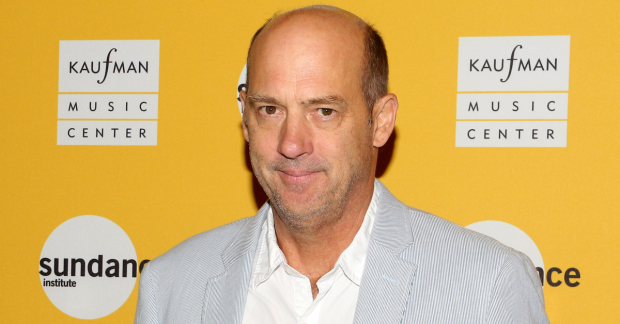ER Star Anthony Edwards Is Back — and Making His Broadway Debut
Edwards, beloved by millions as Dr. Mark Greene, stars in ”Children of a Lesser God” at Studio 54.
Anthony Edwards is up-front and down-to-earth about how he came to star in Kenny Leon's new Broadway revival of Mark Medoff's Children of a Lesser God. "I heard there was an opening," he says with a laugh, "and I thought, 'Wow, I could play that part.' "
Leon obviously agreed. Edwards, known for his portrayal of Dr. Mark Green from NBC's ER, is currently making his maiden voyage on the Great White Way in this Tony-winning 1979 drama, playing Dr. Franklin, an old-fashioned headmaster of a school for the deaf. (Joshua Jackson and Lauren Ridloff also make their debuts as mismatched lovers James Leeds, a speech pathologist, and Sarah Norman, his deaf pupil.)
Edwards famously walked away from ER after season 8, going into a self-imposed exile to be a full-time parent to his young children. Now that they're grown, he's ready for his second act, and it's starting at Studio 54.

(© David Gordon)
This interview has been condensed and edited for clarity.
Tell me about your theatrical background.
I grew up in Santa Barbara, which was a big theater town when I was a kid in the '70s. I was really fortunate because theater was supported in the public schools. By the time I got to high school, I had done 25 shows. I started working professionally when I was 16, auditioning for commercials and television and films, and I went to USC as a BFA drama major. But I was the youngest of five kids, and my parents weren't going to pay for that, so I paid for half and did two years in the BFA program.
I ended up working pretty much right away. I did plays right out of college. I produced a production of Look Back in Anger that Forest Whitaker directed, and it was interracial and we set it in LA, and we got a letter from, I think, Samuel French, saying, "You will never get the rights to our plays ever again." [laughs] I kept doing plays while I was doing television and film. But by the time I started a family in my 20s and 30s, and ER happened, I didn't do any plays after that.
Were you looking for a play when you got Children of a Lesser God?
I was. I did A Month in the Country at Classic Stage in 2015, and I've been doing some TV stuff, but I'm in New York and my kids are grown up, so I could see myself committing to three or four months at a time.
What was it about this play that interested you as an actor?
It goes right to the core of why we go to the theater, to see how people communicate. It's about the attempt to try and find love within a set of given obstacles, and the obstacles are presented here in a really original and beautiful way. It's a Romeo and Juliet story. They're just too immature for a relationship, which is really so tragic. I'm happy because it gives people something to think about the next day. You laugh and you're moved, but you keep thinking about how you're communicating, especially in the time period now, where everything is divided.
Going back to ER, have you watched any of it recently now that it's on Hulu? Did you watch it when it was first airing?
I haven't! As a group, we would meet every week and watch the episode. There was so much going on that you never knew what anyone else was doing. It felt like doing a play, different versions every week. I kept exploring and exploring, which is what you do in a play, and the writing supported that. Because of what we were doing technically, we were able to do four or five pages of dialogue all in one shot, and that required being sharp and being on it in the same way as theater.
Does it ever hit you that you were a beloved character on one of the most popular television shows of all time?
It does at odd times, when you're in some bizarre place and people look at you and goes [in a French accent] "Surgeon!" I'm aware of that. It's interesting now that Hulu is airing it. I get the classic "My grandmother watched the show and now I get to discover it!" I did the first eight years and it was 180 episodes. That's a lot.
What do you think accounts for its longstanding popularity?
It's the writing. Michael Crichton was telling his story, and wanted it to come out of the truth. We used to have an expression that if you held an emotion too long, you're out, because that's not what real people do. Real people don't hold for commercials when someone has just died. That sensationalism that people think is dramatic actually isn't.
That's what I think inspired Mark Medoff to write Children of a Lesser God. He wrote this play for Phyllis Frelich, an exceptional person who was dealing with the conflicts of how we communicate and how much, as a deaf person, she had to assimilate into the hearing world.
This feels like the start of a brand-new phase of your career.
I took a big break after ER, very intentionally, when my kids were little. We moved here to New York, and I spent a lot of time walking them to school. I was fortunate to meet people who said, "You're never gonna regret spending time with your kids." There was no way any job was gonna take that from me. I had the [financial] luxury and spent 10 years doing that. In that same way, it's really fun now going back to work. It feels like it's for the right reasons. It's pretty heavenly.







